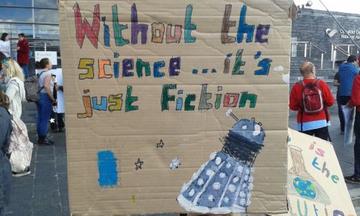Conference: How Sciences End

Credit: Joe Martin
11 July - Radcliffe Humanities Building, Woodstock Road
|
09:00-09:30 |
Welcome (Coffee/Tea/Refreshments) |
|
09:30-11:00 |
Mind, Body, Soul (Chair: Ludmilla Jordanova) |
|
|
Grace Whorrall-Campbell (University of Oxford) The Rise and Fall of Organisational Psychoanalysis: The Tavistock Institute of Human Relations in Mid-Twentieth-Century Britain |
|
|
Rakel Gunnemark (University of Gothenberg) The Seismograph of the Soul: The Decline of Graphology at the End of the 20th Century |
|
|
Yoav Beirach (Max Planck Institute for the History of Science) On Perception, Mathematical Violence, and the Afterlife of Sciences: Did the 17th Century European "Science of Music" Really Come to an End? |
|
11:00-11:30 |
Break |
|
11:30-12:50 |
Ends of Sciences in Conversation 1 (Chair: Alex Aylward) |
|
|
Scientific Atheism Katarzyna Jarosz (University of Wrocław) The Soviet War on Faith: The Rise and Decline of Scientific Atheism Eva Guigo-Patzeltz (EHESS/CNRS Paris) "Marxist‐Leninist religious science", or How to Pass on Scientific Atheism beyond the Collapse of Real Socialism |
|
|
Classifying People John Shepherd (Durham University) Trying to End Lombrosian Criminology in the United States Charlotte Dewarumez (Université Toulouse Jean-Jaurès) Did Physiognomy Disappear?: Anthropology and the Idea of Beauty in the Late 19th Century |
|
12:50-14:00 |
Lunch |
|
14:00-15:30 |
Physics (Chair: Joe Martin) |
|
|
Hiroto Kono (National Museum of Nature and Science, Japan) New Practices from a Dissolved Tradition: The Rise and Fall of "Terada Physics" in Early 20th Century Japan |
|
|
Jaume Navarro (University of the Basque Country) The End of Aether Physics: Historiographical Perspectives |
|
|
Arne Schirrmacher (Humboldt University of Berlin) The End of Naturforschung?: Philipp Lenard’s Plea Not to Become a Scientist |
|
15:30-15:45 |
Break |
|
15:45-16:45 |
Astronomy and Astral Science in India (Chair: Michelle Pfeffer) |
|
|
Shaan Kashyapp (Ravenshaw University) The End of Siddhānta Astronomy: Text and Apparatuses of a Naked Eye Indian Astronomer |
|
|
S Prashant Kumar (University of Chicago/NCBS Bengaluru) Seeing as Believing: Observation and Evidence in Jyotihśāstra, 1837–1903 |
|
16:45-19:00 |
Break |
|
19:00 |
Optional Conference Dinner: Linacre College |
12 July – Faculty of History, George Street, Oxford
|
09:00-10:30 |
Early Modern Ends (Chair: Michelle Pfeffer) |
|
|
Xinqi Wen (University of Cambridge) Beyond the Invention of Tradition: A Reversed History of the Doctrine of Signatures |
|
|
Rodolfo Garau (University of Hamburg) The Fronde, the Court, and the Cosmos: Morin, Gassendi, and Astrology’s Decline in 17th-Century France |
|
|
John R R Christie (University of Oxford) The Ends of Alchemy |
|
10:30-11:00 |
Break |
|
11:00-12:20 |
Ends of Sciences in Conversation 2 (Chair: Joe Martin) |
|
|
Psychical Research and Parapsychology Luis Fernando Bernardi Junqueira (University of Cambridge) Imperialism, Civil War and Psychical Research in Wartime China: Fall or Transformation? Alicia Puglionesi (Johns Hopkins University) The Once and Future Parapsychology: “The Telepathy Tapes” and the Rebirth of Parascience in the Post-Truth Era |
|
|
The Human Sciences Julia Gustavsson (University of Oxford) “[A] changed and changing world”: Professional Expertise and the Fading of Child Study as a Science in Mid-Twentieth-Century Britain Lufeng Xu (EHESS Paris) The End of the “Science of Man”?: Marcel Maus’s Quest for the “Science of Total Man” |
|
12:20-13:30 |
Lunch |
|
13:30-15:00 |
Sciences of Inheritance (Chair: Greg Radick) |
|
|
Wessel de Cock (Humboldt University of Berlin) The Contingent Demise of Classical Genetics in the Molecular Revolution (1958–1962) |
|
|
Vedran Duančić (University of Klagenfurt) The End of Lysenkoism in Socialist Yugoslavia |
|
|
Mia Levenson (Johns Hopkins University) The End of Eugenic Science in the United States |
|
15:00-15:30 |
Break |
|
15:30-16:30 |
Fragmentation and Consolidation (Chair: Alex Aylward) |
|
|
Jarrod Hore (University of New South Wales) Three Challenges in Space/Time: Planetary Consciousness and the Disintegration of Nineteenth-Century Geology |
|
|
Hansun Hsiung (Durham University) How Did Neo-Confucian Nature End? |
|
16:30-16:45 |
Break |
|
16:45-17:30 |
Roundtable (Rob Iliffe, Ludmilla Jordanova, Greg Radick) |
|
|
|
|
|
**Now closed** CALL FOR PAPERS: How Sciences End
Dates: 11–12 July 2025
Location: University of Oxford, UK
Submission deadline: 31 January 2025
Conference Theme and Goals
Historians have studied extensively how sciences begin—but how do they end? This is a crucial question for understanding how the labour of knowledge-making evolves. Previous attention to the founding, disciplining, and professionalisation of individual sciences has provided robust frameworks for thinking through the birth and growth of knowledge-making communities. Far less attention has been directed toward how those same communities decay, dissipate, or evolve beyond the contemporary boundaries of science. This conference seeks to cultivate case studies of the ends of sciences, and thereby to motivate a new approach to thinking about the developmental trajectories of scientific disciplines, communities, institutions, and the ordering of expert knowledge. A further aim is to strengthen the community of scholars with a shared interest in studying the ends of sciences.
Scope and Eligibility
The conference will seek to examine the variety of ways that sciences come to an end. Thus, it will explore not just how some sciences came to be dismissed as pseudosciences, but also to understand those knowledge-making communities which chose to classify themselves as non-scientific, that dissipated while their practitioners and resources migrated into other sciences, or that were otherwise unmade. We also encourage reflection on the hidden continuities which might be masked by narratives of disciplinary demise. Both ‘science’ and ‘ends’ can thus be understood broadly, and eligibility is not restricted by time period or regions. A non-exhaustive list of possible case studies could include: alchemy; anthropology; Aristotelianism; astrology; chronology; cybernetics; divination; eugenics; history; medicine; mesmerism; natural history; natural philosophy; natural theology; phrenology; and psychical research. Students and early career scholars are especially encouraged to submit.
Submission Process
Submissions should be sent to howsciencesend@gmail.com. Please title the email “SciEnds Abstract Submission” and include the following information in the body:
- Full name as you would like it to appear on the programme
- Email address
- Affiliation, or how you would like to be identified on the programme
- Presentation title
- An abstract of no more than 250 words describing your proposed talk and how it fits the conference theme and goals.
- An indication of whether you would like to be considered for travel support. (Limited funds are available to defray travel costs, with priority given to early career and insecurely employed scholars.)
The submission deadline is 31 January 2025. We plan to circulate a draft program by the end of February 2025.



